英语语法及知识点专题练习
新译林英语六年级上册语法知识+练习
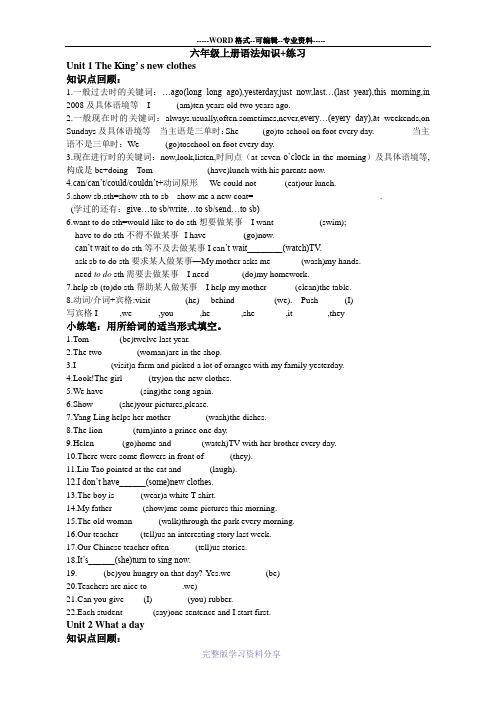
六年级上册语法知识+练习Unit 1 The King’ s new clothes知识点回顾:1.一般过去时的关键词:…ago(long long ago),yesterday,just now,last…(last year),this morning,in 2008及具体语境等---I______(am)ten years old two years ago.2.一般现在时的关键词:ually,often.sometimes,never,every…(eyery day),a t weekends,on Sundays及具体语境等---当主语是三单时:She _____(go)to school on foot every day.-------------当主语不是三单时:We______(go)toschool on foot every day.3.现在进行时的关键词:now,look,listen,时间点(at seven o’cloc k in the morning)及具体语境等,构成是be+doing---Tom ____________(have)lunch with his parents now.4.can/can’t/could/couldn’t+动词原形----We could not ______(eat)our lunch.5.show sb.sth=show sth to sb---show me a new coat=_____________________________.(学过的还有:give…to sb/write…to sb/send…to sb)6.want to do sth=would like to do sth想要做某事---I want __________(swim);have to do sth不得不做某事--I have ________(go)now.can’t wait to do sth等不及去做某事I can’t wait________(watch)TV.ask sb to do sth要求某人做某事—My mother asks me_______(wash)my hands.need to do sth需要去做某事---I need _______(do)my homework.7.help sb (to)do sth帮助某人做某事---I help my mother ______(clean)the table.8.动词/介词+宾格:visit________(he)----behind_________(we).---Push______(I)写宾格I_____,we______,you______,he_______,she_______,it________,they_________小练笔:用所给词的适当形式填空。
小学五年级英语语法及练习题
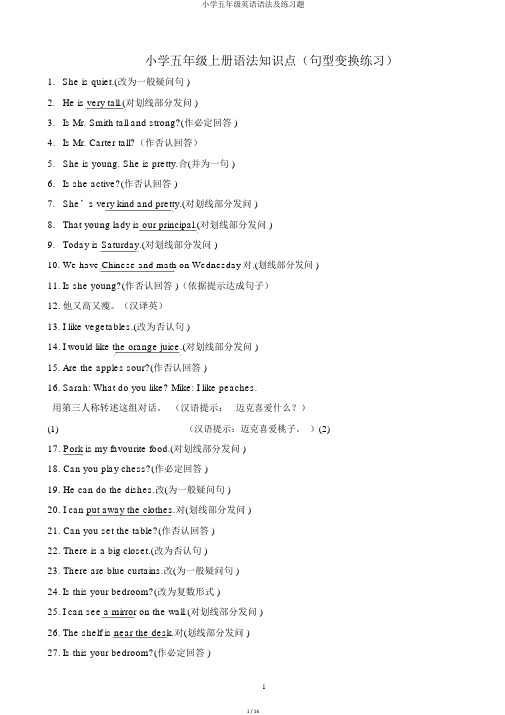
小学五年级上册语法知识点(句型变换练习)1. She is quiet.(改为一般疑问句 )______________________________2.He is very tall.(对划线部分发问 ) ______________________________3.Is Mr. Smith tall and strong?(作必定回答 ) ______________________________4.Is Mr. Carter tall?(作否认回答) ______________________________5.She is young. She is pretty.合(并为一句 ) ______________________________6.Is she active?(作否认回答 ) ______________________________7.She’s very kind and pretty.(对划线部分发问 ) _____________________________8.That young lady is our principal.(对划线部分发问 ) ________________________9.Today is Saturday.(对划线部分发问 ) ______________________________10.We have Chinese and math on Wednesday对.(划线部分发问 ) ___________________________11.Is she young?(作否认回答 )(依据提示达成句子) ______________________________12.他又高又瘦。
(汉译英) ______________________________13.I like vegetables.(改为否认句 ) ______________________________14.I would like the orange juice.(对划线部分发问 ) ______________________________15.Are the apples sour?(作否认回答 ) ______________________________16.Sarah: What do you like? Mike: I like peaches.用第三人称转述这组对话。
初中英语语法知识点总结及练习精选全文完整版
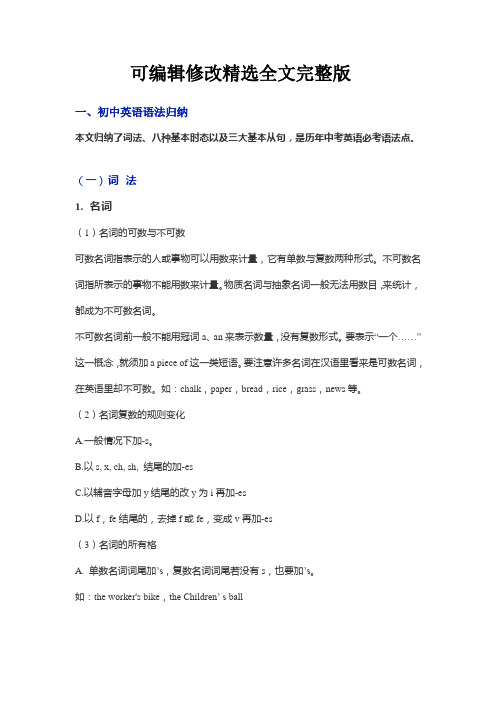
可编辑修改精选全文完整版一、初中英语语法归纳本文归纳了词法、八种基本时态以及三大基本从句,是历年中考英语必考语法点。
(一)词法1. 名词(1)名词的可数与不可数可数名词指表示的人或事物可以用数来计量,它有单数与复数两种形式。
不可数名词指所表示的事物不能用数来计量。
物质名词与抽象名词一般无法用数目,来统计,都成为不可数名词。
不可数名词前一般不能用冠词a、an来表示数量,没有复数形式。
要表示“一个……”这一概念,就须加a piece of这一类短语。
要注意许多名词在汉语里看来是可数名词,在英语里却不可数。
如:chalk,paper,bread,rice,grass,news等。
(2)名词复数的规则变化A.一般情况下加-s。
B.以s, x, ch, sh, 结尾的加-esC.以辅音字母加y结尾的改y为i再加-esD.以f,fe结尾的,去掉f或fe,变成v再加-es(3)名词的所有格A. 单数名词词尾加’s,复数名词词尾若没有s,也要加’s。
如:the worker's bike,the Children’ s ballB. 表示几个人共有一样东西,只需在最后一个人的名字后加’ s若表示各自所有,则需在各个名字后’ s。
如:This is Lucy and Licy’ s room.These are Kate's and jack’ s rooms.C. 如果是通过在词尾加—s构成的复数形式的名词,只加’。
如:the students’ books,the girls’ blouses(另外:名词+of+名词名词是有生命的,我们就用’s结构来表示所有关系。
如果名词所表示的事物是无生命的,我们就要用名词+of+名词的结构来表示所有关系。
) 2. 代词人称代词,物主代词,反身代词,指示代词,不定代词(1)人称代词第一人称单数I me my mine myself复数 we us our ours ourselves第二人称单数 you you your yours yourself复数 you you your yours yourselves第三人称单数 he him his his himselfshe her her hers herselfit it its its itself复数 they them their theirs themselves(2)物主代词物主代词的用法:形容词性物主代词后面一定要跟上一个名词;名词性物主代词可作主语、表语、宾语。
初中英语语法基础知识大全单选题100道及答案解析
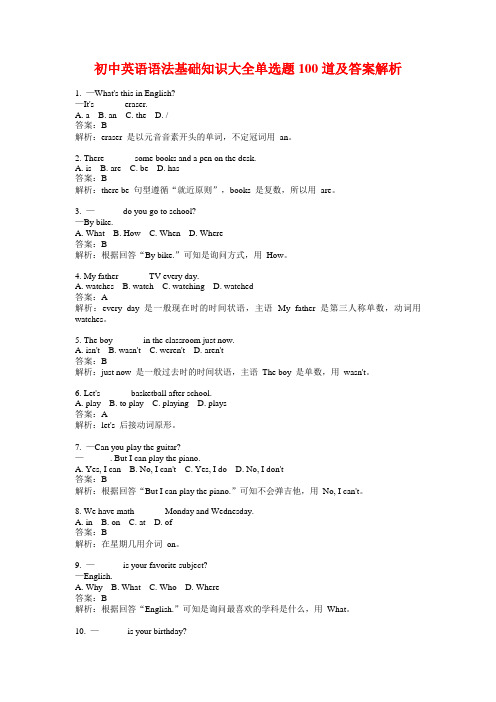
初中英语语法基础知识大全单选题100道及答案解析1. —What's this in English?—It's ______ eraser.A. aB. anC. theD. /答案:B解析:eraser 是以元音音素开头的单词,不定冠词用an。
2. There ______ some books and a pen on the desk.A. isB. areC. beD. has答案:B解析:there be 句型遵循“就近原则”,books 是复数,所以用are。
3. —______ do you go to school?—By bike.A. WhatB. HowC. WhenD. Where答案:B解析:根据回答“By bike.”可知是询问方式,用How。
4. My father ______ TV every day.A. watchesB. watchC. watchingD. watched答案:A解析:every day 是一般现在时的时间状语,主语My father 是第三人称单数,动词用watches。
5. The boy ______ in the classroom just now.A. isn'tB. wasn'tC. weren'tD. aren't答案:B解析:just now 是一般过去时的时间状语,主语The boy 是单数,用wasn't。
6. Let's ______ basketball after school.A. playB. to playC. playingD. plays答案:A解析:let's 后接动词原形。
7. —Can you play the guitar?—______. But I can play the piano.A. Yes, I canB. No, I can'tC. Yes, I doD. No, I don't答案:B解析:根据回答“But I can play the piano.”可知不会弹吉他,用No, I can't。
八年级上册英语语法知识点讲解和练习(学生用)
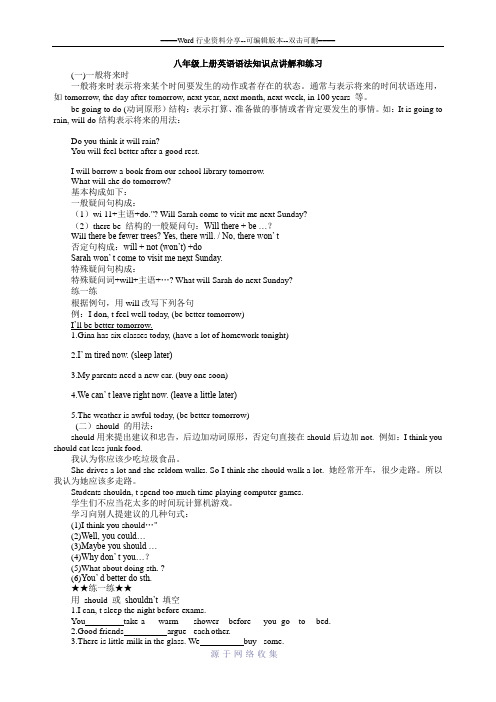
八年级上册英语语法知识点讲解和练习(一)一般将来时一般将来时表示将来某个时间要发生的动作或者存在的状态。
通常与表示将来的时间状语连用,如tomorrow, the day after tomorrow, next year, next month, next week, in 100 years 等。
be going to do (动词原形)结构:表示打算、准备做的事情或者肯定要发生的事情。
如:It is going to rain, will do结构表示将来的用法:Do you think it will rain?You will feel better after a good rest.I will borrow a book from our school library tomorrow.What will she do tomorrow?基本构成如下:一般疑问句构成:(1)wi 11+主语+do."? Will Sarah come to visit me next Sunday?(2)there be 结构的一般疑问句:Will there + be …?Will there be fewer trees? Yes, there will. / No, there won’ t否定句构成:will + not (won’t) +doSarah won’ t come to visit me next Sunday.特殊疑问句构成:特殊疑问词+will+主语+…? What will Sarah do next Sunday?练一练根据例句,用will改写下列各句例:I don, t feel well today, (be better tomorrow)I’ll be better tomorrow.1.Gina has six classes today, (have a lot of homework tonight)2.I’ m tired now. (sleep later)3.My parents need a new car. (buy one soon)4.We can’ t leave right now. (leave a little later)5.The weather is awful today, (be better tomorrow)(二)should 的用法:should用来提出建议和忠告,后边加动词原形,否定句直接在should后边加not. 例如:I think you should eat less junk food.我认为你应该少吃垃圾食品。
初中英语语法知识点精讲+习题+练习(精华版).doc
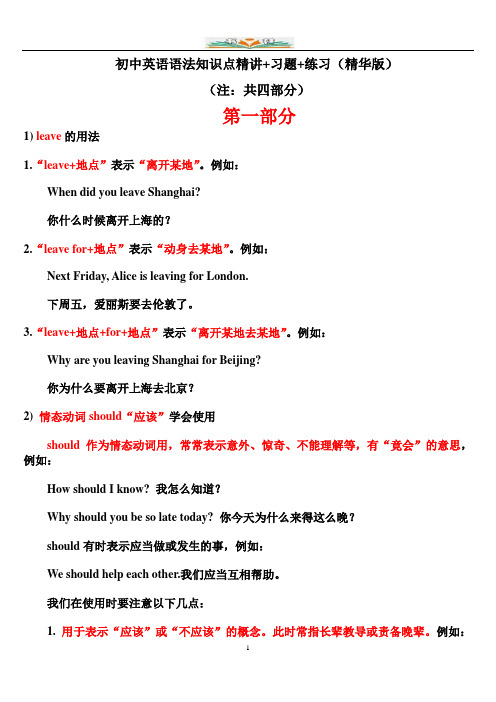
初中英语语法知识点精讲+习题+练习(精华版)(注:共四部分)第一部分1) leave的用法1.“leave+地点”表示“离开某地”。
例如:When did you leave Shanghai?你什么时候离开上海的?2.“leave for+地点”表示“动身去某地”。
例如:Next Friday, Alice is leaving for London.下周五,爱丽斯要去伦敦了。
3.“leave+地点+for+地点”表示“离开某地去某地”。
例如:Why are you leaving Shanghai for Beijing?你为什么要离开上海去北京?2) 情态动词should“应该”学会使用should作为情态动词用,常常表示意外、惊奇、不能理解等,有“竟会”的意思,例如:How should I know? 我怎么知道?Why should you be so late today? 你今天为什么来得这么晚?should有时表示应当做或发生的事,例如:We should help each other.我们应当互相帮助。
我们在使用时要注意以下几点:1. 用于表示“应该”或“不应该”的概念。
此时常指长辈教导或责备晚辈。
例如:You should be here with clean hands. 你应该把手洗干净了再来。
2. 用于提出意见劝导别人。
例如:You should go to the doctor if you feel ill. 如果你感觉不舒服,你最好去看医生。
3.用于表示可能性。
should的这一用法是考试中常常出现的考点之一。
例如:We should arrive by supper time. 我们在晚饭前就能到了。
She should be here any moment. 她随时都可能来。
3) What...? 与Which...?1. what 与which 都是疑问代词,都可以指人或事物,但是what仅用来询问职业。
(整理)英语语法练习题大全

英语语法习题目录第一讲主谓一致第二讲名词第三讲代词第四讲动词分类第五讲动词时态第六讲被动语态第七讲虚拟语气第八讲助动词第九讲不定式第十讲 V-ing 形式第十一讲 V-ed 形式第十二讲形容词/副词第十三讲介词第十四讲连词第十五讲 It 的用法第十六讲定语从句第十七讲名词性从句第十八讲状语从句第十九讲倒装句第一讲主谓一致I.学习重点从句或非谓语动词作主语时的主谓一致表示数量的名词词组作主语时的主谓一致由连接词连接的主语与谓语的一致集体名词作主语时的主谓一致“主语 +with/as well as 等短语”的主谓一致Ⅱ.重点讲解主语和谓语的一致主要指谓语动词必须和作主语的名词或人称代词在人称和数上保持一致。
处理主谓一致关系主要遵循以下 3 条原则。
①语法一致原则,即谓语的单、复数形式依主语的单、复数形式而定:主语为复数,谓语动词用复数;主语为单数或是不可数名词,谓语动词用单数。
②就近一致原则,即谓语动词的人称和数要与它最邻近的名词或代词保持一致。
③意义一致原则,即不以语法形式而从意义着眼处理一致关系,若主语形式上为复数,但意义上是单数,谓语动词需用单数;若主语形式上为单数,而意义上是复数,则谓语动词用复数。
精品文档Ⅲ、自测题1. The committee ______(be) unable to agree on thepolicies .2. The committee ______ (have) decided to give the workers morefinancial help .3. Why he entered the house and how he managed to get out of it withoutbeing seenby people ______ (remain) a mystery to us all . 4. Three years in a strange land ______(seem) like along time .5. He is one of those men who never ______(care) howthey look .6. Law and order ______(mean) different things to people with differentpoliticalopinion s .7. She ’ s the only one of these women who ______ (play)bridge well .8. After the exams ______(be) the time torelax .9. War and peace ______(be) a constant theme in history .10. How is it that your answer and your neighbour ’ s ______(be)identical?11. If either of you ______(take) a vacation now,we will not be able tofinish thework . 12. One third of the population ______(be) working infactories. 13. There ______(be) a bed and two sofas inthe room .14. What he left me ______(be) three smallrooms.15. The crowd at the basketball game ______(be) wild withexcitement.16. None of the students ______(have)finished the examyet .17. A large crowd of people ______(have) gathered under the TownHall clock .18. All but he and I ______(be) going to theExhibition .19. Each soldier and sailor ______(be)given a gun . 20. Attendi ngon campusconcerts ______ (be) par t of the pleasure o f colleg e lif e . 21. There ______(be) more than one answer to yourquestion .22. A number of pages ______(be) foundmissing .23. This isone ofthe books that ______(tell) an authentic story of World War Two . 24. The cat with her kittens ______(be) sitting in thesun .25. What ______(be) your weekly wages?26. Bacon and eggs ______(make) a hearty breakfast for agrowing boy .27. Dancing and skating ______(be) my chiefdelights .28. Only one of the students who______(have) read the articlecan answerthe question .29. John is the only student who ______(have) read the .book30. The number of secretaries in this company ______(be)neverunder 100 .31. Five hundred dollars ______(be) spentyesterday.32. It is I who ______(be) responsible forthis.33. To visit the parks and museums ______(be) reallyenjoyable .34. Every word and phrase in this dictionary ______(be)important .35. What he wants ______(be) a recorder and aradio .36. There ______(be) many a reason why this book sellswell .37. What caused the damage of these cars ______(remain)unknown .38. Two thirds of my friends ______(have) beenabroad .39. Two thirds of the crop ______(have) been damaged by thestorm .40 . The Adventures of Sherlock Holmes______(have) been translated into manylanguages .41. A thousand miles no longer ______ much to us today,for modern jets can easilyget us over this distance within a fewhours .A)meant B)mean精品文档精品文档C)means D)will mean42. It is reported that about two-thirds of the factory ’ s property _______ in the fire .A)are lost B)have been lostC)were lost D)has been lost43.Statistics ______ a rather modern branch of mathematics .A)are B)wereC)is D)are to be44.Every means ______ tried out but never with success,asfar as myknowledge goes .A)is B)has beenC)are D)have been45 . The woman writer and Oscar Award candidate _______ a collection of shortstories .A)have just turned out B)has just turned outC)have just been turned out D)has just been turned out46. The athlete,together with his coach and several relatives,_____ to the Olympic Games.A)are traveling B)is travelingC)were traveling D)have been traveling47. Not only I but also Tom and Mary ______ fond of watching television .A)am B)isC)are D)have48. The audience _______ requested to be in their seats by 7:00 .A)have B)hasC)are D)is49. Your trousers ______ too long . ______ to be shortened a little.A)are;They need B)is;It needsC)are;It needs D)is;They need50. Different forms of government agency ______ different functions .A)is B)areC)has D)have精品文档精品文档第二讲名词I.学习重点可数名词与不可数名词名词的复数词尾变化形式名词所有格名词作定语复合名词作定语时的数单位词Ⅱ.重点讲解名词是表示人、事物和抽象概念的词,它在句中可以作主语、宾语、表语、同位语以及后置定语。
人教版丨七年级上册英语语法专题复习(附练习题及答案)
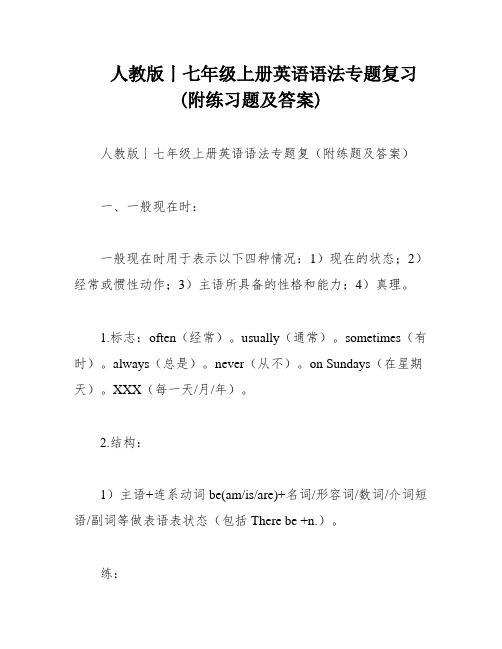
人教版丨七年级上册英语语法专题复习(附练习题及答案)人教版丨七年级上册英语语法专题复(附练题及答案)一、一般现在时:一般现在时用于表示以下四种情况:1)现在的状态;2)经常或惯性动作;3)主语所具备的性格和能力;4)真理。
1.标志:often(经常)。
usually(通常)。
sometimes(有时)。
always(总是)。
never(从不)。
on Sundays(在星期天)。
XXX(每一天/月/年)。
2.结构:1)主语+连系动词be(am/is/are)+名词/形容词/数词/介词短语/副词等做表语表状态(包括There be +n.)。
练:1.I am a student。
My name is Tom.2.Where are my shoes。
They are here.3.Who is the girl with long straight hair。
I think she is Kate.4.You and I are not in Class Six.5.XXX。
Yes。
there is.6.XXX。
No。
they aren't.2)主语(非第三人称单数)+行为动词原形+其他(用助动词do帮助构成否定句、一般疑问句和特殊疑问)。
3)主语(第三人称单数)+行为动词的第三人称单数+其他(用助动词does帮助构成否定句、一般疑问句和特殊疑问句)。
行为动词第三人称单数加-s的形式:1.-s2.辅音+y: study-studies3.以s,x,ch,sh结尾: watch-watches。
XXX4.特殊: have-has。
do-does。
go-goes。
练:1.His parents watch TV every night.肯定句:1.XXX.否定句:2.His parents do not watch TV every night.n: My brother does not do homework every day。
- 1、下载文档前请自行甄别文档内容的完整性,平台不提供额外的编辑、内容补充、找答案等附加服务。
- 2、"仅部分预览"的文档,不可在线预览部分如存在完整性等问题,可反馈申请退款(可完整预览的文档不适用该条件!)。
- 3、如文档侵犯您的权益,请联系客服反馈,我们会尽快为您处理(人工客服工作时间:9:00-18:30)。
英语语法及知识点专题练习(定语从句)V一.什么叫定语从句在复合句中,修饰某一名词或代词的从句叫定语从句。
定语从句有限定性从句和非限定性从句。
在初中阶段多为限定性从句。
被定语从句修饰的词叫先行词,定语从句放在先行词后面,关系代词或关系副词放在先行词和定语从句之间,起连接作用,同时也可作定语从句的某个成分。
引起定语从句的关系代词有that, which , who , whom ,whose 和关系副词where when why等。
二.定语从句中关系代词的用法1.当先行词是不定代词all, much等时,或者被这些词修饰时,只能用that引用定语从句。
例:I’ve read all the books that my mother bought for me .我已经读完了妈妈给我买的所有的书。
2. 先行词被序数词或形容词最高级修饰时,只能用that引导定语从句。
例:This is the most exciting movie that I have ever seen .这就是我曾经看过的最有趣的电影。
3.先行词被the only , the last, the same, the very修饰时,只能用that引导定语从句。
例如:This is the only book that was written by him .这就是唯一一本他写的书。
4.先行词既指人又指物时,只能用that引导定语从句。
例如,They are talking about the school and the teachers that they visited yesterday .5. 当关系代词前介词时,只能用which引导定语从句。
例如:This is the house of which the windows face south.这是那所窗户朝南的房子。
6. 非限定性定语从句只能用which引导定语从句引导。
例如:Football, which is a veryinteresting game, is played in many countries.很多国家都在踢足球,他是很有趣的运动项目。
7.先行词是that,those时,只能用which引导定语从句例如:What’s that which was put in the car ?五.关系代词who, whom, that 的用法区别(先行词指人)1. 在who开头的疑问句中,若出现定语从句修饰指人的先行词时,只能用that引导从句。
例:Who is the boy that is wearing a red coat over there?2. 先行词是those, one 等指人的不定代词,定语从句用who引导。
例:We should help those who are in trouble .3. 先行词是人且介词提前紧跟先行词之后时,只能用whom,引导定语从句。
例如:This I the boy with whom I played tennis .六.知识点1.prefer常用于下例搭配中:1)Prefer doing to doing“喜欢······胜于······”或Prefer A to B意为“A 与B比较起来,更喜欢A。
这里to是介词。
He prefers red to blue.2)prefer to do … rather than do…相当于would rather do … than do…意为“宁愿做······而不愿做······”这里的to为动词不定式符号,后接动词原形。
I prefer to go with you.2.stick 的用法stick是动词,意为“刺;插;粘贴”常用短语有:stick to坚持,stick······into(把······插入);也可作名词,意为“棍;棒”He stuck a fork into a big piece of beef .3.down 的用法Down是形容词,意为“悲哀的;沮丧的”与upset同义;也可作副词,意为“向下”When I was down, I often listen to some light music to make myself calm down.4. plenty of 大量的;充足的。
后可接可数名词复数形式和不可数名词。
There’s plenty of time .5.shut v.关闭(shut ,shut)shut off关闭;切断;停止运转。
We shut off the motor before we left the workshop .6.intelligent 意为“有才智的;聪明的”与clever同义Human beings are much more intelligent than animals .7.praise的用法.praise可作动词或名词,意为“表扬;赞扬”,常用短语有:in praise of 称赞;歌颂,praise for称赞,praise sb.for sth.表扬某人某事。
His composition was praised.8.be supposed to do sth.应该做······,期望······;被认为······。
同义词be excepted to do sth.9.drop by 顺便拜访10. after all 毕竟;终究11.value n.价值,形容词为valuable.12.effort的用法1)不可数名词:表示力量和精力。
I can carry it without effort. It’s a waste of time and effort .2)可数名词:努力,奋斗。
Make an effort to do sth. 尽力。
Please make an effort to get there on time.13.worth adj.“这得;有价值的。
有······价值”,后常跟名词、代词、或动名词作宾语。
She’s not worth getting angry with. be worth doing sth. ······值得做14.point v. (用······)指;指向point at表示进指,at后一般跟动作的目标。
point to表示远指,to后一般接动作的方向。
point out指出He pointed the gun at her head . He pointed out the danger of driving alone .15. go out of one’s way to do sth.特地(努力)Thanks for going out of your to help me.16.make sb. feel at home使某人感到宾至如归She is very kind to me and always makes me feel at home17.be/get used to 与used to do.be/get used to “习惯于”,后接名词、代词或动名词。
My brother is used to staying up late. used to do “过去常常”后接动词原形。
The village isn’t like what it used to be.18. except, besides , but 与except forExcept “除······之外”指除外的部分不包括在内。
All came except John.besides“除······之外还有”指除外的部分包括在内.也可作副词表示“此外”We all succeeded besides Linda .我们所有的都成功了包括Linda .but“除了”常与某些不定代词nothing, all, anyone连用。
There’s nothing but wait .except for“除了”指对某些基本情况用于具体细节方面的修正。
He’s a good man except for his temper .他是个好人,只是脾气不好。
19.be comfortable doing sth.顺便地做某事20.no matterno matter“不论;无论”与what, who, when, where, which, how等疑问词连用,引导让步状语从句(通常用一般现在时代替一般将来时,用一般过去时代替过去将来时)如:“no matter+疑问词”相当于“疑问词后接ever.”No matter what you say, I won’t believe you .不论你说什么,我都不相信。
21.avoid v.“避免;躲避”后接名词、代词或动名词。
They avoided mentioning that name .22.every day 与everyday every day “每天”在句子做状语。
everyday 为形容词。
“每天的;日常的”在句子做定语。
She wears an everyday suit every day .23.absent adj.“缺席;不在”“做某事缺席”时后跟from. Some students were absent from class.24.influence v&n. 指在思想、性格、行为等方面所产生的潜移默化的“影响”have an influence in sth.在某方面有影响。
